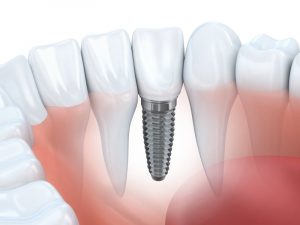
You’ve lost a permanent tooth and need to replace it. After all, you don’t want to have a gap in your smile! The more you research, the more that dental implants seem to stand out from the rest of the replacement choices available. But what makes them such a highly recommended treatment option? How do you know whether you qualify for dental implants? In this post, get more background information about dental implants and understand what you need to have successful treatment.
Benefits of Dental Implants
As a tooth replacement option, dental implants are the most advanced method that the dental field has to offer, restoring the entire tooth including the root. As a result, dental implants provide many advantages that other replacement options can’t, such as the following:
- High success rate. About 90 percent of dental implants are still successful after 10 years.
- Better long-term oral health. When a tooth is lost, the jaw bone loses density, changing your facial shape and potentially leading to more tooth loss later. The jaw bone stays strong with dental implants.
- Protection for remaining teeth. Unlike partial dentures and dental bridges, implants do not impact your remaining healthy teeth, helping them stay that way for longer.
- Long lifespan. Dental bridges need to be replaced every 7 to 10 years, but when properly cared for, dental implants can last for 30 or more years.
Dental Implants Process
When you and your implant dentist have determined that dental implants are the right treatment for you, the process goes as follows:
- The post is surgically inserted beneath the gums, where it stimulates the jaw bone.
- Over the course of 3 to 6 months, the jaw bone surrounds the post in a process called osteointegration.
- When it is fully healed, a metal abutment piece is attached to create the desired contour for the gums.
- Finally, a dental restoration is put on top.
Factors Determining Eligibility for Dental Implants
Although dental implants have a high success rate, implant failure can happen. To prevent this, you need to have the following two things.
Good Oral Health
If you have an oral infection, such as gum disease, when the dental implants are placed, the supporting bone and tissue may not heal properly, causing implant failure. That’s why it’s important to have a consultation with your dentist before the procedure so that they can ensure your oral health.
Strong Jaw Bone
For the dental implant to integrate with the jaw bone, the jaw bone needs to have sufficient density and strength. Otherwise, the implant won’t have enough support to handle the chewing and biting forces impacting it. If your jaw bone needs extra reinforcement, you may benefit from having a bone graft performed before the dental implant is placed.
In the end, the best way to know whether you’re a good candidate for dental implants is to schedule a consultation with your dentist. They can evaluate your specific case, answer your questions, and provide valuable insights about your tooth replacement options. So what are you waiting for? Contact your dentist today to get on the path toward restoring your smile’s full health, strength, and function.
About the Author
After graduating in the top 15 percent of his class at dental school, Dr. Darren Koch completed a one-year residency in general dentistry and earned his Advanced Education in General Dentistry certificate. With nearly two decades of dentistry experience, he continues to build on his expertise in implant dentistry through Spear Education courses and forums. To schedule an appointment with him, you can call (919) 859-6633 or click here.






